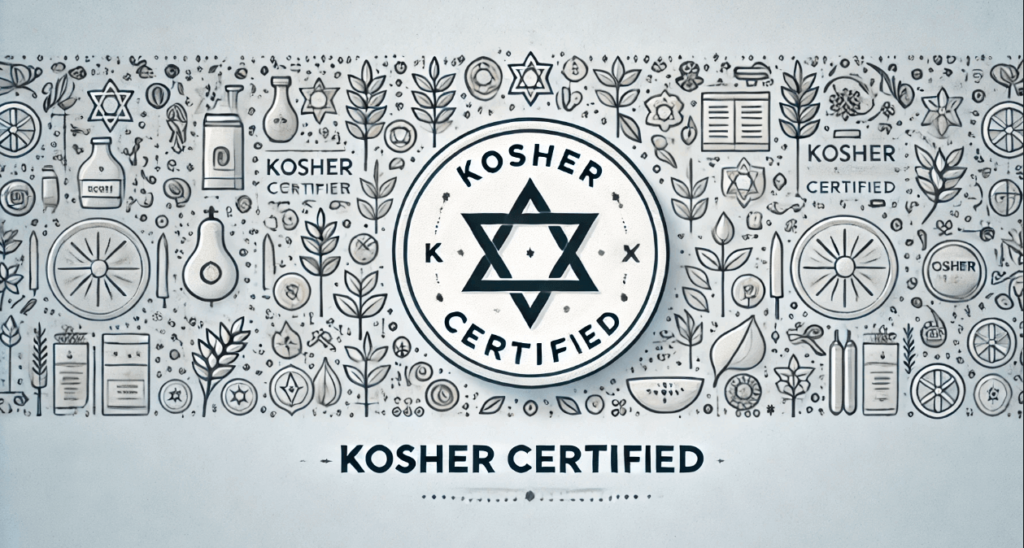Navigating the Kosher certification process in India can seem like a daunting task, especially if you’re new to the concept. Whether you’re a food manufacturer, restaurant owner, or involved in the supply chain, understanding Kosher certification is crucial if you aim to tap into this growing market. This step-by-step guide will walk you through the process, from understanding what Kosher means to choosing the right Kosher certification agency, including the role of Orthodox Kosher Supervision.
Understanding Kosher Certification
What Does It Mean to Be Kosher?
The term “Kosher” refers to food that meets specific religious dietary laws as set out in the Torah. These laws dictate not only what foods can be eaten but also how they must be prepared, processed, and consumed. For instance, meat and dairy products cannot be mixed, and animals must be slaughtered in a particular manner. Kosher certification ensures that a product complies with these religious requirements.
Types of Kosher Certifications
There are various types of Kosher certifications depending on the specific dietary requirements and religious interpretations. These include Pareve (neutral, neither meat nor dairy), Dairy, Meat, and Passover (which has additional restrictions). Understanding these distinctions is vital as they can significantly affect your product’s marketability.
Why Kosher Certification is Essential for Businesses in India
Growing Market for Kosher Products
In recent years, there’s been a noticeable increase in demand for Kosher products in India, driven by both the Jewish community and health-conscious consumers who perceive Kosher-certified foods as higher quality. Obtaining Kosher certification can open up new markets for your products, both locally and internationally.
Benefits of Obtaining Kosher Certification
Kosher certification not only helps you reach a broader audience but also adds a layer of credibility to your brand. It signals to consumers that your products meet stringent quality and ethical standards, which can be a significant differentiator in the marketplace.
Choosing the Right Kosher Certification Agency
Importance of Selecting an Accredited Agency
Choosing the right Kosher certification agency is crucial as it can affect the credibility of your certification. An accredited agency ensures that your certification is recognized globally, which is particularly important if you plan to export your products.
Overview of Orthodox Kosher Supervision
Orthodox Kosher Supervision is one of the most trusted names in the Kosher certification world. Known for its rigorous standards, Orthodox Kosher Supervision provides a seal of authenticity that is widely recognized and respected. Opting for their certification can significantly enhance your product’s reputation.
Step-by-Step Guide to Kosher Certification in India
Step 1: Initial Consultation
The first step in the Kosher certification process is an initial consultation with a Kosher certification agency. During this phase, the agency will seek to understand your product, your manufacturing processes, and your goals for certification.
Understanding Your Product
This involves a detailed review of your product, including ingredients, sourcing, and preparation methods. The agency will assess whether your product can meet Kosher standards and what modifications, if any, are necessary.
Defining Certification Goals
Clearly outlining your certification goals will help the agency tailor the certification process to your needs. This could range from certifying a single product to obtaining full Kosher certification for your entire facility.
Step 2: Application Process
Once you’ve completed the initial consultation, the next step is to formally apply for Kosher certification.
Gathering Necessary Documentation
You’ll need to provide detailed documentation about your product, including ingredient lists, processing methods, and facility information. This documentation is crucial for the agency to evaluate whether your product can be certified as Kosher.
Submitting the Application
After gathering all the necessary information, you’ll submit your application to the chosen Kosher certification agency. The application process may vary depending on the agency, but generally, it involves an in-depth review of your documentation.
Step 3: Inspection and Review
Once your application is submitted, the agency will schedule an on-site inspection.
On-Site Inspection
An inspector will visit your facility to ensure that your production processes comply with Kosher laws. This includes verifying that all equipment is suitable for Kosher production and that there is no cross-contamination with non-Kosher products.
Reviewing Ingredients and Processes
The inspector will also review your ingredients and processes to ensure they meet Kosher standards. Any non-compliant ingredients will need to be replaced, and processes may need to be adjusted.
Step 4: Compliance and Recommendations
If the inspection uncovers any issues, the agency will provide recommendations for achieving compliance.
Addressing Non-Compliance Issues
You’ll need to make the necessary changes to address any non-compliance issues identified during the inspection. This might involve altering your sourcing practices or modifying your production processes.
Implementing Recommended Changes
Once you’ve addressed the non-compliance issues, you’ll implement the recommended changes. The agency may require a follow-up inspection to ensure that all issues have been resolved.
Step 5: Certification and Ongoing Supervision
After your facility and products meet all Kosher requirements, the agency will issue your Kosher certification.
Receiving the Kosher Certification
Upon successful completion of the certification process, you’ll receive a Kosher certificate, which you can use to market your products. This certification is usually valid for one year, after which it must be renewed.
Regular Audits and Renewals
Kosher certification involves ongoing supervision to ensure that your products continue to meet Kosher standards. This typically includes regular audits and inspections.
Common Challenges in the Kosher Certification Process
Ingredient Sourcing Issues
One of the most common challenges is sourcing Kosher-compliant ingredients, especially in regions where such ingredients are not readily available. Working closely with your Kosher certification agency can help you find suitable suppliers.
Understanding Kosher Laws
Kosher laws can be complex, especially for businesses unfamiliar with them. It’s crucial to work with a knowledgeable Kosher certification agency that can guide you through the process.
Maintaining Kosher Status
Maintaining Kosher status requires ongoing vigilance. Any changes in your ingredients, suppliers, or processes must be reviewed by your certification agency to ensure continued compliance.
Costs Involved in Kosher Certification
Breakdown of Certification Costs
The cost of Kosher certification can vary widely depending on the scope of the certification and the agency you choose. Typical costs include application fees, inspection fees, and ongoing supervision fees.
Hidden Costs and How to Avoid Them
There may be hidden costs associated with achieving and maintaining Kosher certification, such as the need to replace non-compliant equipment or ingredients. To avoid surprises, it’s essential to get a detailed cost breakdown from your certification agency.
Maintaining Kosher Certification
Regular Inspections and Compliance
Regular inspections are a key component of maintaining Kosher certification. These inspections ensure that your products continue to meet Kosher standards.
Renewing Your Certification
Kosher certification must be renewed annually, and this process usually involves a re-inspection of your facility and products. Staying compliant throughout the year will make the renewal process smoother.
Role of Orthodox Kosher Supervision in India
How Orthodox Kosher Supervision Works
Orthodox Kosher Supervision is known for its strict adherence to Kosher laws. Their process involves thorough inspections, regular audits, and stringent compliance checks to ensure that certified products meet the highest Kosher standards.
Benefits of Orthodox Kosher Supervision
Opting for Orthodox Kosher Supervision offers several benefits, including global recognition of your certification, which can help you reach a wider audience. Their reputation for strict standards also adds a layer of credibility to your products.
Conclusion
Navigating the Kosher certification process in India may seem challenging, but with the right guidance and preparation, it can be a smooth journey. By understanding the requirements, choosing the right Kosher certification agency, and following the steps outlined in this guide, you’ll be well on your way to tapping into the growing market for Kosher products. Whether you’re aiming to expand your business locally or internationally, Kosher certification is an investment that can yield significant returns.




